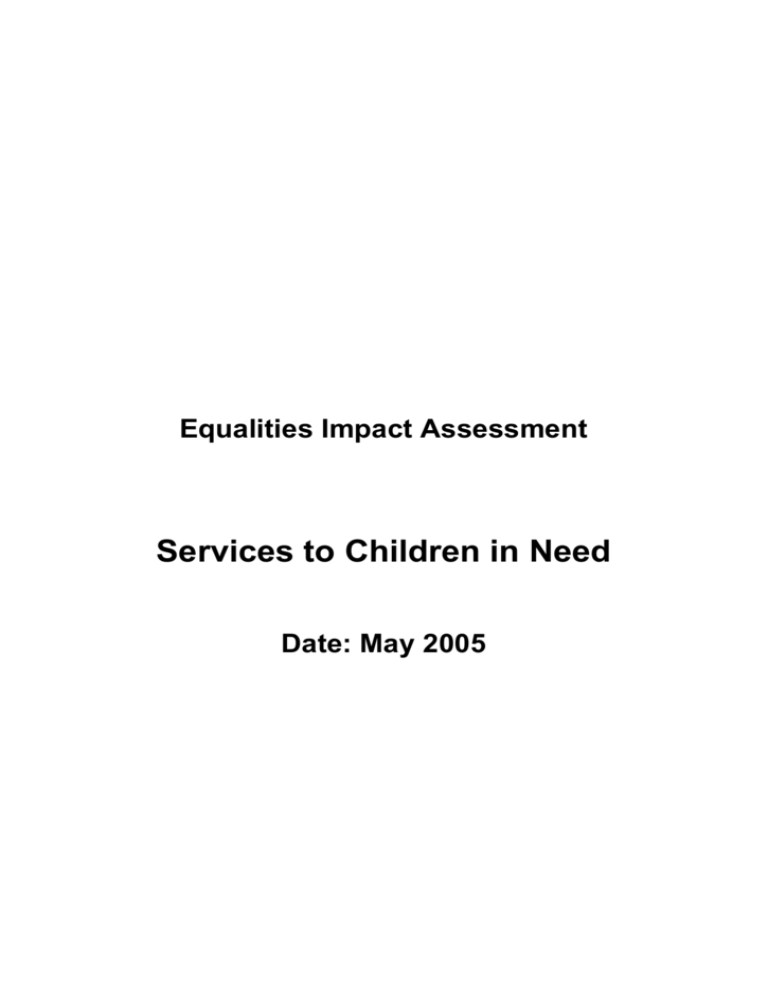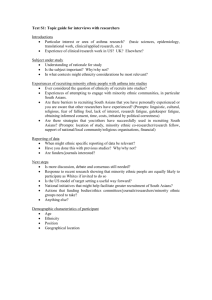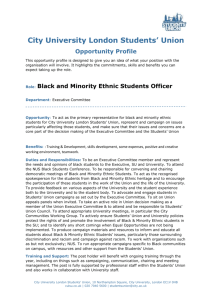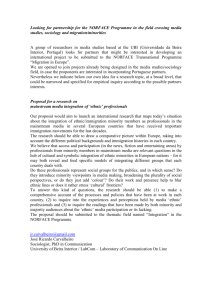Services to Children in Need
advertisement

Equalities Impact Assessment Services to Children in Need Date: May 2005 Record of Equality Impact Assessment Department/Service Area Children's Social Services - Services to Children in Need Equality areas assessed1 Race; Culture; Language; Religion; Disability; Gender; Relevant Key Stakeholders Service Users, particularly those from minority ethnic communities Children's Social Services Staff Other agencies Policy assessed2 The Child Care Strategy. Services to Children in need of Protection Services to Children and Families in need of Support Services are provided under the terms of The Children Act 1989 The Children (Leaving Care) Act 2000 The Adoption and Children Act 2002 The Children Act 2004 and other relevant legislation and Government Guidance. These impose on the Local Authority various duties, including: To safeguard and promote the welfare of children To investigate concerns or allegations which suggest that a child may be suffering significant harm. To look after children who cannot be looked after by their families; and to promote the welfare of such children. In providing services to take account of the wishes and feelings of the child. In providing services to have regard to the race, language, religion and cultural needs of the child. Therefore, services are provided to Children in need of protection, and their families Children looked after Children who have left the care of the local authority Children in need of support, and their families. It is important to note that this is not a universal service, but is targeted at those who are assessed as being in need of services. 1 2 Specify from race; disability; gender; sexual orientation; religion or belief; age Name of policy; brief description of its purpose, services governed by it and who it is intended to serve Related Policies and Procedures Children's Services Procedures ACPC Procedures Data collection and consultation3 Extensive data is collected on service activity and performance against Performance Indicators. This is reported on a Quarterly basis through the Activity and Performance Monitoring report produced by the Management Information Service. This includes some statistical information on ethnicity, including comparisons of the number of children from ethnic minority backgrounds on the child protection register/looked after compared with the numbers in the general population. For example 16% of child protection (section 47) assessments are carried out on non white children - 10.7% in relation to dual heritage children. There is also information on referrals by ethnicity and looked after children by ethnicity. The numbers are small and require some caution but suggest that while black children and those from dual heritage backgrounds are over represented, those from Asian backgrounds are under-represented. Information on the extent to which services comply with Section 22 of the Children Act 1989 (regard to race language religion and culture) is gathered through the work of the Black Cases Panel. This also looks at issues of gender - but only in relation to the children considered. The Department has not carried out any consultation specifically related to this assessment, but members of the Children's Services Management Team meet on a regular basis with representatives of the Black Workers Group, when discussions include attention to service issues. The Department is a lead member of the Area Child Protection Committee (ACPC). The Development Subcommittee of the ACPC oversees the work of a culturally appropriate practice subgroup, which has been involved in monitoring procedures as they are developed and has developed certain specific procedures. The ACPC has also run a Communities Day to involve community leaders and representatives in discussions on issues relating to the protection of children. Issue: What consultation can/should we carry out as part of this exercise? 3 Outline what data was collected, what consultation took place and what other references were used in carrying out the assessment Key findings4 The Black Cases Panel was established in 2000 to examine the Department's work with black children and families and to help social workers and other staff to ensure that the cultural etc needs of ethnic minority children are addressed within assessments and met within services. Over the period since, a number of findings and issues have emerged and these have been reported on an annual basis. Where appropriate the findings have been shared with other services (Education, CAMHS). The main findings have included: The need to improve information gathering on the exact racial and cultural origins of children assessed, particularly those from dual heritage backgrounds. That children of dual heritage are consistently over represented in referrals to the Department and in active cases. Identification of this issue led to increased support to a project - Two Halves One Whole - offering support and work on identity issues to children from dual heritage backgrounds and their parents. The complexity and variety of the multi-cultural composition of the population as children from increasingly varied backgrounds have been considered. That black children and families continue to experience racist abuse and intolerance; and that some services, including some schools address this inadequately (this was reported to Education and contributed to a positive approach to the issue). That adoption services to black and minority ethnic children are positive and work hard to ensure culturally appropriate placements with no significant delay. That private fostering of black, particularly African, children remains a concern which merits particular attention. That constant attention is needed to ensure that the Department is able, as far as possible to provide culturally appropriate or sensitive placements for black and minority ethnic children. That there are particular issues relating to asylum seeking children and that the Department's approach to this area of work is effective. The importance of liaison with adult services where issues such as adult mental ill health affect the welfare of children. That over the period that the Black Cases Panel has met, practice has developed such that attention to the needs of minority ethnic children and families is more likely to be considered as an integral part of assessment and service provision. Conclusions5 4 5 Within the Social Services Department, particular attention is paid to assessing the needs of children from minority ethnic communities. The Black Cases Panel has acted as a focus for this work and has been commended as a good practice initiative. Summary of results of the assessment Conclusions drawn from the results of the assessment in terms of the equality impact of the policy Reports from the Panel have drawn attention to policy, practice and resource issues. These have been reported to CSMT and other agencies and bodies as appropriate. Action(s)6 The Black Cases Panel identifies specific actions that need to be taken. Specific actions arising from this Assessment: Monitoring7 Actions identified and the response to them are followed up and the outcome reported in the subsequent report of the BCP Authorisation8 ? Contact9 Service Manager, Child Protection and Review Unit, Chair of Black Cases Panel. 0116 265 7409. bparker@leics.gov.uk 6 7 8 9 Measures to be taken to mitigate any adverse impact Arrangements for monitoring implementation of measures to mitigate impact Name and post of officer authorising outcome of assessment Contact details to discuss or comment on the impact assessment





